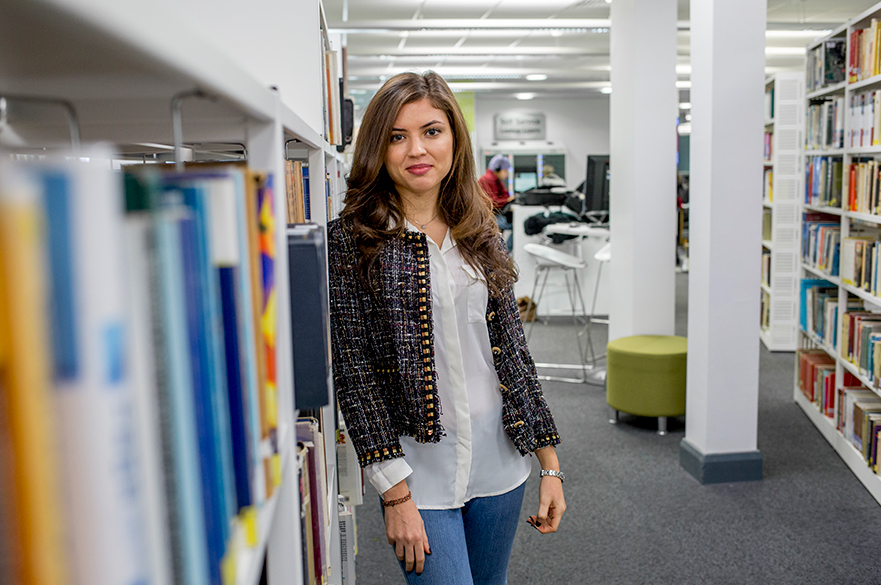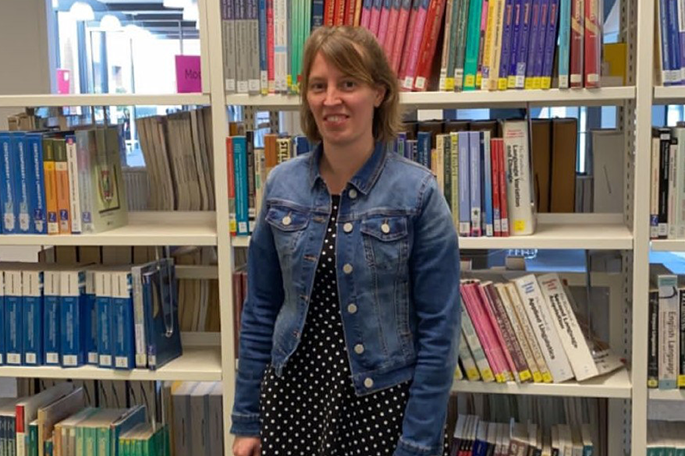
Emily
Boaler
Course studied: Modern Languages (French, Spanish, Italian)
We now offer: University Language Programme
More about Emily
Emily Boaler graduated from NTU in 2013 with a BA in Modern Languages (French, Spanish, Italian). Ten years on, Emily tells us about her journey from NTU to Oracle, where she now works as a Multilingual Technical Support Engineer. In our catch up, Emily describes the transferable skills that she has picked up while studying at NTU and how they have been crucial in helping her get to where she is today.
Ten years ago, I completed my French, Spanish and Italian course at NTU. I left university having no idea what I wanted to go into. I was so focused on my dissertation and studying for my exams that I just didn’t spend time thinking about what I actually wanted to do. Despite attending numerous career events and being offered support with my CV and cover letters, I was none the wiser. All I knew was that I wanted to use my language skills. I promised myself that I would only accept multilingual job offers. Ten years later I can well and truly say that I have fulfilled that promise.
I first started working in August 2013 and have worked at Retail Assist, Littlefish, Capita Travel and Events and now Oracle. Here are some of the transferable skills I picked up at university and how they helped me progress in my career:
Prioritising effectively
During my entire degree I found myself having to prioritise effectively. This became more evident in final year. I remember during one of my last weeks I had many exams and a dissertation to hand in. I had to make quick and efficient decisions on what to prioritise my time on. Without prioritising effectively, I would have gone to exams unprepared and may have even missed the deadline for the dissertation. Prioritising is key in the workplace too, such as in IT where you have to prioritise tickets raised by customers deciding on which issues are high priority and which ones aren't.
Meeting deadlines
There are always deadlines to meet at university. You learn how to work effectively under pressure miraculously allowing you to meet these deadlines however large your current workload. Meeting deadlines is also essential in the workplace, whether that may mean sending out so many invoices by a certain time or having a deadline for contacting customers to install a specific type of software.
Accepting and learning from criticism
We always received some sort of criticism at university, whether it was for pronouncing words wrong or missing off agreements at the end of words. This was constructive criticism which helped us to improve on our weaknesses preventing us from repeating the same errors. Learning to accept criticism isn't always easy, but as one adapts to it, we are able to turn our weaknesses into strengths with a push in the right direction. Accepting criticism is also vital in the workplace and can knock your confidence but being able to accept it and improve from it is a skill and if we don't accept it, we will never improve.
Intercultural skills
On the degree course itself lecturers and fellow students were from other countries, during my year abroad, I worked along people not only from the country where I was living, but foreign students from other EU countries, Asia, Latin America and Africa. We are all different, but we all learnt to accept one another’s differences and generally got on well. Being exposed to people from many nationalities can prepare us for the workplace as it will be extremely likely that we will be working with other nationalities. Strong intercultural skills are key to learning how to accept cultural differences, keeping peace and for building strong relationships, allowing teams to become more productive benefiting the company.
Flexibility
Modules varied from language to interpreting to history to film. Thanks to the variety of modules, the course allowed us to become more flexible when it came to considering careers. A typical linguist will follow many career paths and will change sector several times. I was open to roles in many sectors requiring foreign languages. So far, I have worked in Tourism, Finance and Tech. I have also done bits of translation and teaching on the side as many foreign language graduates do. My sister graduated with a degree in French and Spanish and has worked in Teaching, Exports and Translation. Despite completing a similar degree we have worked in completely different sectors and it just goes to show the variety of roles pursued by a multilingual graduate.
Writing skills
To receive good grades at university your writing must be of a high calibre. We didn't just write essays at university, but newspaper reports, summaries, translations, PowerPoint presentations, articles of persuasion as well as many others. Essays had to be well structured with a clear introduction, beginning, middle, end and conclusion, evidence had to be carefully drawn to back up what we said, choose our words carefully and linked our ideas together in a logical way. Writing skills can be useful in the workplace when writing emails to the customer and in roles such as marketing and sales as strong writing skills ensure effective business communication and can allow you to become more credible to a customer.
Strong people skills
At university we are surrounded by different people all the time, whether that’s our fellow course mates, lecturers or guest speakers. Being comfortable talking to different people in the workplace is also key, whether that’s talking to colleagues, managers, directors, or clients. You are often remembered when speaking to people well and treating them with respect. This is key to helping you grow your career and leaving companies on a good note. The world is small, and people talk.
In conclusion, it’s clear to see that skills picked up at university have been transferred into the workplace and have allowed me to gain a plethora of experience and to climb up the career ladder. After graduating it’s vital for a graduate to be aware of the skills picked up and to know how these skills can be promoted to a potential employer.
University Language Programme
The ULP provides a range of courses where you can learn a new language or improve your existing foreign language skills.
NTU graduate?
Stay connected with the NTU alumni and supporter community.
Still need help?
-

STUDENT PROFILE
Allegra Masciarelli
International RelationsItaly
https://www.ntu.ac.uk/study-and-courses/courses/our-students-stories/arts-humanities/allegra-masciarelli
-

STUDENT PROFILE
Bella
BA (Hons) Spanish & European StudiesUnited Kingdom
https://www.ntu.ac.uk/study-and-courses/courses/our-students-stories/employability/bella-t
-

STUDENT PROFILE
Claire Hickenbotham
Creative WritingUnited Kingdom
https://www.ntu.ac.uk/study-and-courses/courses/our-students-stories/arts-humanities/claire-hickenbotham